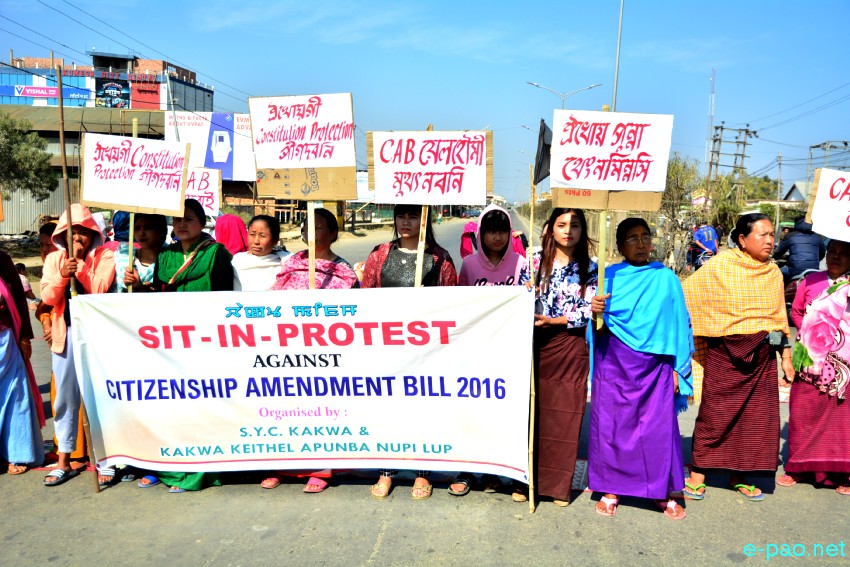Minds of the Movement
An ICNC blog on the people and power of civil resistance
by Binalakshmi "Bina" NepramSeptember 20, 2019
Last January, the people of the state of Manipur and northeast India rose up against the Indian government’s attempt to introduce the Citizenship Amendment Bill, which they found discriminatory and a grave violation of the Indian Constitution and Universal Declaration of Human Rights. Millions mobilized in protest across the region.
A group of Manipuri women who call themselves the Meira Paibis ("Women with Torches") led many extraordinary nonviolent demonstrations that lasted for weeks—and ultimately compelled the government to withdraw the bill the very next month, last February.
But this was just the most recent example of their organizing—the Meira Paibis have been active for decades, notably against the Armed Forces Special Powers Act (AFSPA), a controversial act that has spurred police impunity in the northeast region.
This blog post focuses on their long nonviolent struggle over conditions in Manipur. India is often referred to as the world’s largest democracy, but one may question what kind of democracy imposes martial law on its own people. Government agencies suppress news from Manipur, so very few people in India and elsewhere know about this conflict.

Source: Author.
The Armed Forces Special Powers Act
Manipur, which shares a border with Myanmar, is home to 2.2 million people belonging to 39 indigenous communities. Manipur was an independent Asian nation state until 1949 when it was merged under duress with the Union of India. This controversial merger triggered political conflict in Manipur.
India then put areas of the northeast region under the draconian Armed Forces Special Powers Act (AFSPA) in 1958, an act that violates the Constitution of India and the Universal Declaration of Human Rights. The AFSPA provides complete impunity to Indian military forces while operating in indigenous areas of Manipur and the northeast. Anyone can be arrested, imprisoned, or killed merely on suspicion, without an arrest warrant and without a right to trial.
The Meira Paibis
Manipuri women, especially mothers who are called Meira Paibis (“women with bamboo torches”) have been at the forefront of a strong nonviolent peace and resistance movement since the start of counter-insurgency operations that took place in late 1970s. Women’s groups in Manipur have developed many powerful nonviolent actions designed to confront the insurgency that has engulfed the region in the last seven decades.
Yet the Meira Paibi movement originated long before the AFSPA, with a public demonstration first in 1904 against the British colonial administration. Hundreds of women protested forced labor (lalupkaba in Manipuri) of Manipuri men, ultimately succeeding at pressuring the British to withdraw the practice that same year.
Then in 1939, women stood up against what they called chaktangba (a rise in food prices such as rice). They protested the colonial government’s oppressive policies, in particular export-oriented economic policies, in a movement known as Nupi Lan. These policies impacted Manipuri people’s food supply, namely rice. Women who were directly involved in market activities upturned the bullock carts siphoning off Manipuri rice. They also took delegations to meet the British Political Agent and others in charge. Over the years, this movement has evolved to inspire other movements.
In the 1970s, the women of Manipur came out from their homes and started a mass movement for the maintenance of social order and peace in Manipur. They started as an anti-liquor movement in urban and rural areas. Women in the concerned localities themselves conducted audits of establishments that served and sold liquor. The movement slowly evolved from an informal group into a political force.
Nonviolent Tactics against the AFSPA
When the military began patrolling the streets at night in the 1970s and early 1980s, women of Manipur worked with local youth clubs to develop an early-warning system aimed at preventing youth arrests, deaths, and disappearances. They built meira shangs, meaning “bamboo huts” in areas around Manipur. Women then took turns holding a vigil in the huts at night. Whenever they saw an army convoy coming, they would make a clanging sound called kangsi khingba using a stone. This would alert women from neighboring localities to converge and distract or physically overwhelm Indian armed forces so they could not take youth away from their homes in the cover of darkness. Because families cannot file cases against Indian armed forces for their actions, prevention seemed the only solution.
The women of Manipur have since brought their nonviolent organizing to greater heights. One of the landmark actions took place in July 2004 when 12 mothers of Manipur staged a unique protest where they disrobed in front of the main paramilitary headquarters in Kangla, Imphal, Manipur to denounce the rape and extra-judicial killing of a 31-year-old indigenous woman by the name of Thangjam Manorama from Bamon Kampu.
Other nonviolent methods the women have used to fight state repression include sit-in protests and silent marches wearing funeral attire of light peach phaneks (meaning sarongs) and enaphis (meaning shawls).
Some Meira Paibis are also involved in building alternative institutions as part of this effort: handling crimes against women happening in communities; monitoring and controlling trafficking of women and girls; dealing with family disputes; solving land disputes between neighbors; and providing shelter to many destitute women. When some cases do not go well, the public criticizes the Meira Paibis.
Despite these challenges, these women have become an institution in their own right today. Manipur is dotted by the meira shangs safe spaces mentioned above, contributing to a greater feeling of safety in communities despite 70 years of armed conflict.
Remaining Challenges and Goals
However, like in other parts of Asia and the world, Manipur remains a patriarchal society. When it comes to decision-making, the women of Manipur are largely side-lined. There are currently 17 peace talks going on between the Indian government and various armed groups in the region. However, not a single woman is included in those peace talks. It is important that Indian government recognize this and ensure a place for women in decision-making, and at the same time repeal the AFSPA, a stain on the Indian democracy.
Because a considerable number of UN experts, special rapporteurs, and others in the international community have started taking note of the situation in Manipur, a new goal of the movement has been to appeal to potential allies within India and around the world. Manipur women have spoken out at human rights and other fora at the UN in Geneva and New York and have struck alliances with several global organizations such as Nobel Women Initiative, Women’s International League for Peace and Freedom, International Peace Bureau, as well as with various indigenous groups such as FIMI and MADRE.
As the people of Manipur continue to live under the AFSPA, the Meira Paibis’ extraordinary efforts have gone on tirelessly. Still today, the Manipur night sky lights up with hundreds of meiras, flaming bamboo torches—a sign that the historic trend of nonviolent movements shaping Indo-Burmese history is still alive and well.
Watch:

Binalakshmi “Bina” Nepram
Binalakshmi “Bina” Nepram is an award-winning scholar and civil rights activist who is Founder-Director of Manipur Women Gun Survivors Network/CAFI. Bina was born in Manipur Nation currently located in India’s northeast region next to Myanmar. She is the founder of two other organizations working on peace and justice and has authored five books.
Read More